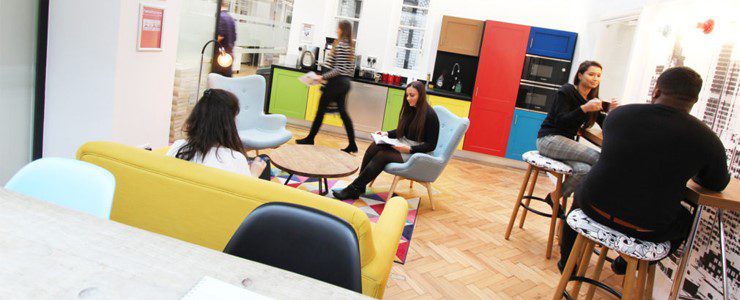
What is coworking?
Coworking is a word you’ll hear frequently in business circles – but what exactly does it mean? Some of the world’s biggest start-ups began in coworking spaces, so it’s something worth considering if you’re looking for office space.
The term was first used in 2005 by entrepreneur Brad Neuberg, who created the first coworking space in San Francisco. Today, the coworking industry is a fast-growing movement.
Neuberg was working at a start-up called Rojo but admitted to feeling unhappy with his job. He wanted the freedom and independence of working for himself, combined with the community and structure of working with other people.
How it all began
Part of the plan he came up with was to create a new kind of space to support his goals, giving it the name “coworking”. A shared office called the San Francisco Coworking Space, it was open two days a week in Spiral Muse, in the Mission district.
Neuberg was renting the space for $300 a month from Spiral Muse and other coworkers would pay when they used the space. It was empty for a month because no-one had heard of “coworking” and didn’t know what it was.
After rethinking how to promote his idea, Neuberg welcomed his first official coworker – athlete and start-up developer, Ray Baxter. After a slow start, the concept grew rapidly.
Today, coworking has become a global phenomenon, with an annual growth rate of 24.2%. Coworking spaces appear in major cities all over the world. Analysts predict there will be more than 30,400 coworking spaces, with more than 5.1 million people taking part, by 2022.
Defining co-working
It’s the key to combining life and work in a sustainable manner, linking real estate, community and technology. Widely seen as the way people will work in the future, coworking spaces provide a collaborative, productive environment for their users. They are created without corporate constraints, providing a working environment with flexible memberships to suit users’ needs.
Coworking has been defined as a gathering of people who work independently, while sharing values. They are interested in the synergy that occurs from working alongside each other. Although they might be self-employed or work for different employers, they use the same office and work side-by-side, typically sharing equipment and ideas.
Who benefits?
This can work for different setups, such as small businesses, freelancers and corporates. Businesses gain coworkers to compare ideas, supporting each other professionally, in a way that can’t be achieved from working in a corporate office or from home. It connects coworkers to a network of professional peers.
Small businesses benefit because there isn’t a long lease to commit to and there are less overhead costs. Everything they need is available, including meeting rooms and kitchen facilities. Most coworking spaces are in central business areas, where there’s access to transport, shopping, cafes and gyms.
Renting independently in this type of area would be financially impossible for most businesses, but coworking makes it a reality. There are no worries about having to stock up on supplies, or worrying about the WiFi, because everything is taken care of.
Freelancers and corporates
Freelancers have the freedom of deciding when and where they will work, enjoying the benefits of an office environment and the perks of being in a community of like-minded coworkers. Perfect for people who would otherwise work alone from home, or in a cafe or library, it’s a good way to make new contacts and friends, meet potential clients and possibly new business partners.
Forward-thinking corporates are embracing coworking space, as it benefits their employees, creating a happier workforce, more productivity and new networking opportunities with people from different domains. Coworkers are networking on a daily basis.
The choice of coworking spaces is extensive and can include multi-use spaces that provide a flexible layout, studios in refurbished industrial buildings and offices where small start-ups can work in the same space.
Famous companies that started life in coworking spaces include Uber, which has now expanded to 51 countries; and Instagram, the app that was developed in just eight weeks.
Headspace Group specialises in coworking space for the creative, media and technology sectors. Contact us to find out more about how our flexible workspace could work for you.
Image © Maksym Povozniuk / Adobe Stock



